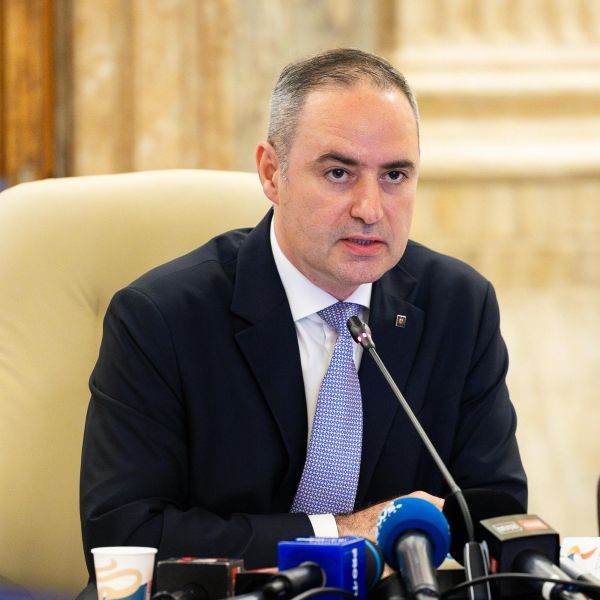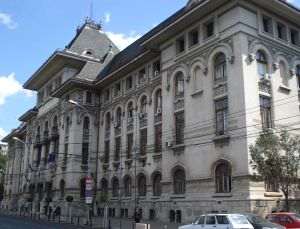The budget deficit after the first ten months of the current year amounts to 5.7% of Gross Domestic Product (GDP), 0.5% lower than the same period last year, Alexandru Nazare, Minister of Finance, declared yesterday during a press conference in which he presented the budget execution data at the end of October and the coordinates regarding the second budget rectification that would be approved in today's government meeting.
Alexandru Nazare said: "First of all, it is about the decrease in the deficit recorded compared to last year, compared to the deficit on October 18, 2024, which was 6.2% of GDP. In October 2025, the execution recorded a deficit of 5.7% of GDP. It is a difference of almost 0.5%, which means the following things. First of all, it confirms that the trend that we anticipated regarding the annual deficit of 8.4% of GDP is a valid one. Second, it confirms the hypotheses that we launched when we adopted the measures this summer. These measures are effective, and the execution in October reflects this. And the deficit recorded in the month, that is, in October alone, is 6.3 billion lei compared to last year when the deficit recorded in the month was 13 billion lei."
The Minister of Finance indicated that the value added tax collected in October 2025 amounted to 13.6 billion lei, which is the highest level in 2025, with an increase of 2.4 billion lei compared to last year and an increase of 1.4 billion lei compared to September of this year.
Minister Nazare also detailed other aspects of the budget execution for the first 10 months of the current year: "Regarding personnel expenses, in the third quarter we recorded a decrease of approximately 629 million lei, an amount to which is added another decrease of 562 million lei related only to October 2025. In other words, practically in the third quarter and October we have accumulated a saving of almost 1.1 billion lei in terms of personnel expenses. Another issue that I would like to point out refers to goods and services. Expenditure on goods and services recorded a decrease of 716 million lei in October. Of course, the chapter on goods and services compared to last year increases, but in the execution of October compared to September 2025 we have a decrease of 716 million lei.”
He also showed that in the investment area, spending on European funds, including subsidies from the European Union for Agriculture, increased by approximately 25%, reaching 51.4 billion lei, or over 10 billion euros. Regarding investments strictly, expenditures increased by 8.6% compared to the same period last year, that is, they reached 96 billion lei in October 2025 compared to 88 billion lei in October 2024.
Under these conditions, Minister Alexandru Nazare stated: "This execution practically confirms, both on the revenue and expenditure levels, that the measures adopted so far are having effects. I say that the execution confirms this, because, although we have had many confirmations from rating agencies, we have also had informal confirmations from the European Commission and public ones through the autumn report, this is also confirmed by the figures. (...) This execution, which confirms the downward trend in the budget deficit, is very important. This does not mean that Romania's entire fiscal and budgetary problem is solved. We are waiting for a very important consolidation next year. A decrease in the deficit from 8.4% of GDP, as we forecast it will be at the end of this year, to 6% of GDP at the end of next year, represents a a major consolidation that has not happened many times in recent history”.
• 11% VAT for HoReCa and next year, plus budget correction for Health and Transport
Asked during the press conference what is happening with the analysis of the HoReCa sector regarding VAT collection and whether the respective tax will increase next year for this field of activity, the Minister of Finance replied that VAT revenues have increased in HoReCa and stated that he will support within the governing coalition that for 2026 in the hospitality sector the VAT rate should remain at 11%.
He also spoke about the second budget correction of this year and stated: "The budget correction will enter tomorrow (ed. - today) in the government meeting. This budget correction preserves the deficit target at 8.4% of GDP. We have redistributed the amounts within the budget starting from the premise of spending, anticipating the expenses for the last month of the year in several ministries, so that we can identify savings where they can be made, and to meet certain essential spending needs where they exist. Basically, most of the rectification focuses on covering amounts in the health sector. We cover medical services, medicines, sick leave, of over 2 billion lei. This is the largest amount that you will find in the budget rectification and of course we also cover needs related to certain arrears payments at the Ministry of Transport. This is practically the second amount, the most important. And to cover these needs, we made savings mainly from the Ministry of Finance and then collected amounts from several credit officers, discussing with them so that we can see exactly what amounts they intend to spend in December. Always when we discuss a rectification there are many requests, some of them are very large and we have to look at each request separately. If additional amounts are needed to cover pensions, personnel expenses - as was the case in the first budget amendment of this year - we will cover them”.
• Minister Nazare: "The minimum turnover tax, a brake on economic development”
Regarding the measures that the Government should take next year to relaunch the economy, Alexandru Nazare mentioned that the Ministry of Finance supports such measures, but they must be compatible with fiscal consolidation.
"The recovery plan must be designed in such a way that it does not compromise all the gains that Romania has achieved in the account. So, from this point of view, it must be a correct, thoughtful, well-calculated plan, and the impact of each individual measure must, of course, be included within the resources we have for 2026 and in the fiscal-budgetary trajectory. We have already started discussions in this area. The Ministry of Finance is working on such a recovery plan. We are also discussing with the representatives of the coalition and I am convinced that we will have a coherent recovery plan. (...) I want to give an example that is not related to these negotiations. It is about the amount that we are injecting for microenterprises and SMEs through the Investment and Development Bank. We will have 1.2 billion euros subsidized for SMEs starting with 2026. Basically, in 2026 there are 6 billion lei that will be injected into the market for SMEs and microenterprises. I think this injection is a very important economic recovery measure for next year and it is a measure that does not have an impact on the budget deficit. So it is exactly the kind of measure that we need at the moment. It is started, it exists and it is not the only one of this type. IDB also has very important programs in preparation for three regions of the country, where we will also have subsidized loans for capital for microenterprises and SMEs, because entrepreneurs need to be supported. These programs do not affect the budget deficit and are already underway”, declared Alexandru Nazare.
The Minister of Finance indicated that, also to support the economic recovery, the Government should eliminate taxes that hinder investments and specified: "You know very well that I proposed the elimination of the minimum turnover tax (IMCA) since this summer. There was no consensus in the coalition regarding its elimination at that time. Now it seems that there is greater availability in the coalition. We will hold negotiations regarding IMCA because this tax hinders development, hinders investments and if we still intend to revive the economy, we must remove these brakes that hinder economic recovery. We are talking about aberrant taxes, such as IMCA and it is not the only one. Okay, to the extent of the possibilities that we will have within the 2026 budget, but, from my point of view, eliminating these fiscal aberrations introduced last year is a very important thing that will support relaxation”. Asked what will happen to local taxes and fees, which could increase from January 1, 2026 by 75%, and those for cars and vehicles by even 300%, Alexandru Nazare said: "These issues related to property tax increases are part of the second set of fiscal measures that is being contested at the Constitutional Court. You know very well that both with regard to property and with regard to motor vehicles, this was required, it was committed by the PNRR to be done since 2023. The deadline is exceeded by almost two years. As long as we do not want to take certain measures, we should no longer commit to doing them or to doing them, as the Government committed through the PNRR. And here I am talking about the commitments made by any government of the country, because the things we have assumed must be achieved. I repeat, this issue, both in terms of property taxes and vehicle taxes are part of a milestone included in the PNRR, a milestone that was overdue for almost two years".
















































